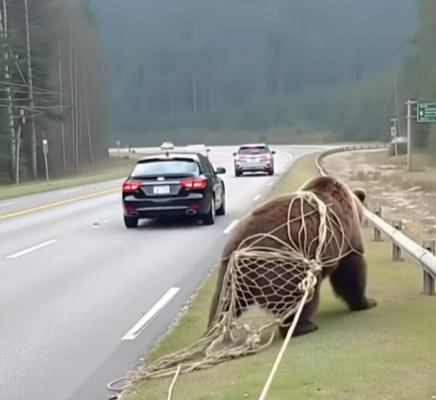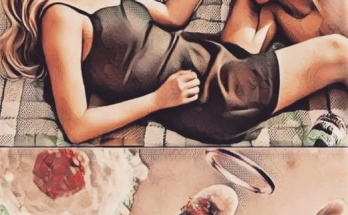Hazard Lights and Heartbeats: What the Bear Taught Me
The first time I truly understood how thin the veil between control and chaos can be, I was sitting in my car on the edge of a forest road with my hazard lights blinking into the dark. My heart was pounding hard enough to shake my ribs, each thud echoing louder than the flares of orange reflecting off the pine trunks. And in front of me, lumbering with a kind of indifferent authority, was a bear.
It wasn’t the first bear I’d ever seen. I’d encountered them from a safe distance while hiking, flashes of brown or black moving through trees, usually disappearing as quickly as they appeared. This one, though, was different. This one wasn’t a fleeting shadow on a trail. It was here, in the cone of my headlights, close enough that I could hear its breaths—deep, unhurried, and full of a life force that dwarfed my own.
I had pulled over only minutes earlier to check a map. My phone had died hours before, and in the silence of the forest, the blinking hazard lights were my only company. Their clicking rhythm matched my growing nervousness. That sound, so mechanical, so human, was suddenly competing with the ancient soundtrack of the wilderness—rustling leaves, distant owls, and now, the heavy footfalls of a bear.
For a moment, I thought about honking. I thought about revving the engine, about asserting my presence. But I stayed still. Something about the bear’s unhurried confidence disarmed me. This wasn’t a creature to be startled or challenged. It didn’t need my fear, and it didn’t need my bravado.
Instead, I watched. The hazard lights painted its fur in pulsing streaks of amber, like firelight dancing on an old, living statue. Every blink of the lights reminded me that I was fragile, mechanical, temporary—while it was elemental, eternal, carved by time itself.
That’s when I felt my heart, not just pounding, but speaking. Every beat was a question. Why are you here? What do you want from this life? The bear wasn’t threatening me; it was holding up a mirror. And in that mirror, I saw someone rushing from one obligation to another, too often blinking like my hazard lights—loud, urgent, and repetitive, but not truly moving anywhere.
I remembered the way I’d been living: endless schedules, constant alerts on my phone, meetings stacked like boxes in a warehouse. My days were hazard lights—signals of stress, signals of crisis—but they didn’t guide me forward. They only reminded me of how often I was standing still, panicking in place.
The bear stopped in front of my car. Its eyes caught the headlights, glowing with an almost spiritual luminescence. I gripped the steering wheel even though I wasn’t driving. My body wanted to flee, but my heart wanted to stay.
And then the bear did something unexpected: it sat. Not fully, not lazily, but in a way that seemed almost deliberate. It looked toward the trees, as if considering them, and then back toward me. For those long seconds, it felt less like an animal and more like a teacher.
What did it want me to learn? Perhaps that presence matters. That life isn’t about blinking signals or racing pulses, but about being grounded enough to sit in the darkness without panic. The bear didn’t run from the unknown. It didn’t try to control everything. It simply was.
I thought about the times I’d ignored my own heartbeats—moments when stress made me numb, when exhaustion silenced my inner voice. I realized then that the body always tells the truth, if only we’re willing to listen. My hazard lights had been warnings, but my heartbeats were guidance. The bear, sitting in front of me, illuminated the difference.
Eventually, it rose, stretching with the kind of grace that made my own stiffness feel absurd. It walked slowly toward the trees, unbothered, majestic in its disregard for my presence. And just like that, the forest swallowed it. My hazard lights kept blinking, but now they felt silly, like a child’s toy flashing in the dark.
When the bear was gone, I turned them off. I sat in silence. My heart, still racing, began to slow, but not into its usual distracted rhythm. Instead, it felt strong, deliberate. I realized that fear had stripped away all the noise, leaving only the raw pulse of existence.
Driving away, I didn’t just carry the memory of the bear; I carried the lesson. Hazard lights are temporary. They warn us when something’s wrong, when we’re stopped on life’s road, when we need attention. But heartbeats—they are constant. They remind us that even in fear, even in stillness, we are alive. And life isn’t meant to be lived in warning mode. It’s meant to be lived in rhythm, with the courage to face the wilderness of uncertainty.
Since that night, I’ve tried to live differently. I still have schedules, still feel stress, still forget myself in the tide of daily routines. But every now and then, I hear the echo of those heavy bear breaths. I feel the thrum of hazard lights flashing uselessly in the dark. And then I close my eyes, touch my chest, and find my heartbeat.
The bear taught me that survival isn’t just about caution. It’s about presence. It’s about knowing when to stop signaling danger and start listening to the truth beating inside you.
Hazard lights can keep you visible for a while, but heartbeats are what carry you forward. And when the forest closes in, when the unknown stands before you with the weight of eternity, it’s not the lights that matter. It’s whether you’re brave enough to sit in silence, breathe deeply, and trust the rhythm of being alive.
That’s what the bear taught me.

